高教版中职英语(拓展模块)Uint 4《Education》ppt课件2
高教版中职英语(拓展模块)Uint 4《Education》2

Practice Work in small groups of 4 or 5. without any preparation, tell the others about your primary school. Each student should speak for no more than 60 seconds. Someone in the group should time each speaker, and stop them if they exceed the time limit. After each person has spoken, the others in the group should each ask at least one question. Use a different expression each time you ask a question.
பைடு நூலகம்
Responding to answers
A final aspect of questioning is how you respond to the answer you are given. It’s important to let the person answering your question know whether their answer is satisfactory; for one thing, they need to know if they’ve said enough! If they have, it may be enough simply to nod, or you could say one of the following. Yes, I see. OK, thanks. Thanks, that’s clear now.
unit_4职高英语基础模块2unit4

THNK YOU
汇报人:XX
06
PPT的总结和评价
主题:unit_4职高英语基础模块 2unit4
PPT的总结
特点:注重实用性和可操作性, 适合职高学生使用
添加标题
添加标题
添加标题
添加标题
内容:包括词汇、语法、阅读、 写作等方面的知识
评价:内容丰富,讲解清晰,易 于理解,有助于提高学生的英语 水平
PPT的评价和建议
内容丰富,逻辑清晰 设计美观,色彩搭配合理 动画效果适当,不喧宾夺主 建议增加互动环节,提高观众参与度 建议在关键信息处添加标注,便于观众理解 建议对PPT进行定期更新,保持内容的新鲜度和时效性
路径动画:让元素沿着 特定路径移动
缩放动画:让元素进行 缩放
颜色动画:让元素进行 颜色变化
动画触发器:设置动画 的触发条件,如点击、
鼠标悬停等
进入动画:让元素以各 种方式进入PPT
退出动画:让元素以各 种方式退出PPT
旋转动画:让元素进行 旋转
动画效果选项:调整动 画的速度、延迟、重复
等参数
透明度动画:让元素进 行透明度变化
结论:总结 PPT的制作 和演示技巧, 强调PPT在 职高英语教 学中的应用 和重要性
各章节的主题和内容
第一章:介绍PPT的基本概念和 用途
第三章:分析PPT
添加标题
添加标题
第二章:讲解PPT的制作过程和 技巧
第四章:探讨PPT在实际工作中 的应用和价值
03
unit_4职高英语基础模块 2unit4.ppt
汇报人:XX
目录
01 P P T 的 标 题 和 内 容 概 述 02 P P T 的 章 节 和 主 题 03 P P T 的 布 局 和 设 计 04 P P T 的 动 画 和 交 互 05 P P T 的 演 示 和 讲 解 06 P P T 的 总 结 和 评 价
高教版中职英语(拓展模块)Uint 4《Education》ppt课件1
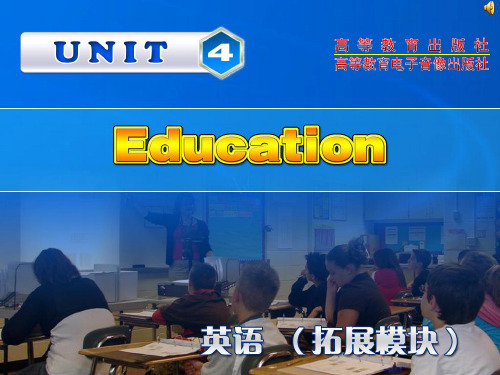
W: Yes, I tห้องสมุดไป่ตู้ink so.
M: What’s your major?
W: English literature.
M: What’s your major? W: English literature. M: What subjects will you study? W: In order to graduate, every student must
B. How much do you charge every year D. How many students can get the scholarship
W: Hello, I want to enroll my child in your school. __________ in your school?
M: That’s why you are so excited! Great job, Marry! When does it start?
W: The last week of August.
M: You must have a lot to do before you leave.
W: Yes. I have to get a visa, buy a plane ticket, and pack my things. But first, I want to register for an English class.
W: Yes. That’s why I have to register this class.
M: Then it is easy now. the computer usually saves extra places for our students.
高教版职高英语(基础模块)Unit课件
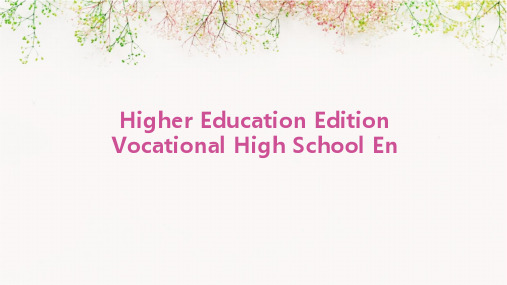
Skimming and Scanning
Teaching students how to skim for overall meaning and scan for specific information to efficiently extract information from a text.
Multiple-choice questions
Design questions based on a listening passage, requiring students to choose the correct answer from multiple choices.
Gapfilling exercises
Predicting skills
The ability to predict the content and structure of the speech based on the given context and background knowledge, to help focus on key information.
06
reading comprehension
Reading skills explanation
Predicting the main idea
Teaching students how to predict the main idea of a passage by analyzing the title, headings, and the first paragraph.
Debate and discussion
Organize debate or discussion activities to encourage students to express their ideas and opinions in English, and improve their language expression ability.
英语知识点高教版中职英语(拓展模块)Uint 4《Education》word教案-总结
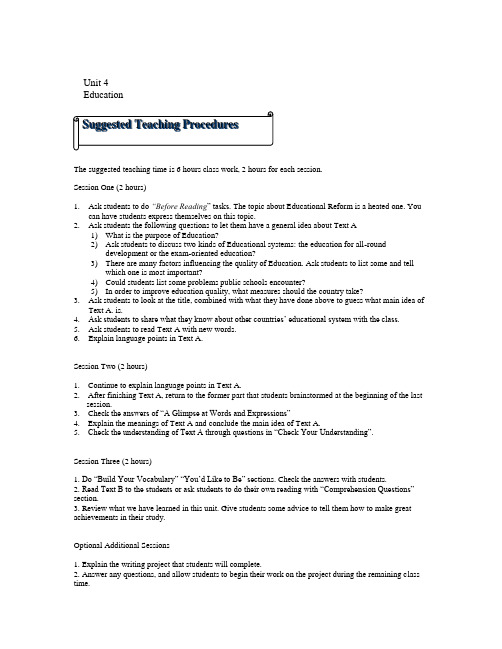
Unit 4EducationThe suggested teaching time is 6 hours class work, 2 hours for each session.Session One (2 hours)1.Ask students to do “Before Reading” tasks. The topic about Educational Reform is a heated one. Youcan have students express themselves on this topic.2.Ask students the following questions to let them have a general idea about Text A1)What is the purpose of Education?2)Ask students to discuss two kinds of Educational systems: the education for all-rounddevelopment or the exam-oriented education?3)There are many factors influencing the quality of Education. Ask students to list some and tellwhich one is most important?4)Could students list some problems public schools encounter?5)In order to improve education quality, what measures should the country take?3.Ask students to look at the title, combined with what they have done above to guess what main idea ofText A. is.4.Ask students to share what they know about other countries’ educational system with the class.5.Ask students to read Text A with new words.6.Explain language points in Text A.Session Two (2 hours)1. Continue to explain language points in Text A.2. After finishing Text A, return to the former part that students brainstormed at the beginning of the lastsession.3. Check the answers of “A Glimpse at Words and Expressions”4. Explain the meanings of Text A and conclude the main idea of Text A.5. Check the understanding of Text A through questions in “Check Your Understanding”.Session Three (2 hours)1. Do “Build Your Vocabulary” “You’d Like to Be” section s. Check the answers with students.2. Read Text B to the students or ask students to do their own reading with “Comprehension Questions” section.3. Review what we have learned in this unit. Give students some advice to tell them how to make great achievements in their study.Optional Additional Sessions1. Explain the writing project that students will complete.2. Answer any questions, and allow students to begin their work on the project during the remaining class time.3. As students work, provide feedback and support. Encourage students to make their own plans and to make discussions with other students.Web Resources/blogs/19833/(How_Public_Education_Cripples_Our_Kids_and_Why)/DEBATES/public_education_failure.HTM(公立学校的讨论)/library/news/aa050400a.htm(debate on the school spending)/pubtopic.htm(education policy)/Research/ressinglesex.html/student/Is_single_sex_education_better.htmlAfter studying this unit, students should be able to:Understand the controversy over single-sex education; the main crux of public education and its temporary condition in AmericaToday, formal education serves a greater percentage of the U.S. population than at any time in history. It played an important role, but still exist some problems. The influence of modern psychology and of education reformers such as John Dewey caused schools to become less formal, more relaxed, and somewhat more centered on the individual child rather than on the institution or the society. School facilities improved for most students, except perhaps in the inner cities. More money was spent on education, resulting in both a general upgrading of teacher salaries and improvements in programs that focus on specific kinds of students, such as special education.Besides, some members of the school reform movement believe that too little power exists at the local level. They claim that teachers and schools can increase their effectiveness only by having greater authority over such fundamental matters as curriculum content, teaching methods, and hiring of staff. Other reformers contend that not all local communities have the resources to provide quality education. They argue that to meet goals of equity and excellence, all local districts should meet high educational standards and provide ample school budgets.What’s more, in America, as for education, people hold different point of view about this question which works better: single-sex education or co-education?The conventional thinking thirty years ago was that education would break down gender stereotypes. Also, promoting equality of the sexes and eliminating gender bias have been a huge societal theme for several decades now. With that in mind coeducation which is based on that laudable theme of equality seems like the right way to go. However, some believe that coeducation does not work for every child. The same sex education is the better choice for the education of the youth of today. Since students are the potential of the future economy, it is our responsibility to provide them with best that we can. Same sex education can help, and can help a lot.Also, we know the plain truth that boys and girls learn in different ways. Research shows that a girl's brain is different from a boy's brain. One size does not fit all. Besides, some view single sex education as an opportunity to capitalize on the learning differences inherent in boys and girls.From the above, we can know that as for education in America, there is a lot of debate. With the study of Text A and Text B, let students grasp the general idea of American education.Before moving into Text A, the instructors should lead students to doing “Before Reading” and “A Glimpse at Words and Expressions” which will help warm up the students. Students’ preview of both TextA and TextB should be strongly encouraged.☞ Develop the ability of critical thinkingIn this section, one should know what is critical thinking?Critical thinking is that mode of thinking - about any subject, content, or problem - in which the thinkerimproves the quality of his or her thinking by skillfully taking charge of the structures inherent in thinkingand imposing intellectual standards upon them.Critical thinking can be seen as having two components: 1) a set of information and belief generatingand processing skills, and 2) the habit, based on intellectual commitment, of using those skills to guidebehavior.What is a good critical thinker?•raises vital questions and problems, formulating them clearly and precisely; •gathers and assesses relevant information, using abstract ideas to interpret it effectively comes to well-reasoned conclusions and solutions, testing them against relevant criteria and standards; •thinks open-mindedly within alternative systems of thought, recognizing and assessing, as need be, their assumptions, implications, and practical consequences; and • Communicates effectively with others in figuring out solutions to complex problems.Critical thinking is, in short, self-directed, self-disciplined, self-monitored, and self-correctivethinking. It presupposes assent to rigorous standards of excellence and mindful command of their use. Itentails effective communication and problem-solving abilities and a commitment to overcome our nativeAfter studying this Unit, the instructors should teach students how to read texts critically? How todevelop a habit that while reading they should hold a question mark in their mind? And with Text A andText B, the instructors should set an example to students on how to read texts in a critical way, and thenencourage students to read books after class in a critical way.☞ Extend vocabulary through recognition of prefixes of degree and sizeIn this section, the instructor should explain to the students the prefixes of degree or size. Firstly, letstudents understand the meaning of the prefixes; then encourage students to put them into practice, teachingthem how to make up new words by adding such prefixes to original words. Through learning this section,instructors should cultivate the students to develop a habit that while encountering strange words, theyshould analyze the formation of the word to guess its meaning and in addition, teach students how to useprefixes of degree or size to enlarge their vocabulary. Instructors could teach prefixes of degree or size withexercises in “Building Your Vocabulary ”.1. Browse the Websites, /usaeducationsystem.htm, and try to get familiarwith the development of American Education System . 2. The instructors should introduce some good American newspapers to students such as USA Today,New York Times, Los Angeles Times, Washington Post, etc or some websites and read articles: for example /~cma8660/mirror//chapters/.After students search some material related to this Unit, the instructor should allow them to find theirpartners to have a discussion about the Education in America.e L e a a r r n n i i n n g gA Glimpse at Words and ExpressionsPlease read the following sentences. Pay attention to the underlined part in each sentence and see how these expressions are used in the context, and then write down their meanings in the blanks provided.1. Academic standards have sunk out of sight. (have decreased or even disappeared).2. When those poor results are recognized, the system and its defenders can be counted on to say that the problem is insufficient spending. ( sure that sth will be happen)3. Reich argues that while public school systems in affluent areas are turning out students who are college or work-ready because they have le arned “to identify and solve new problems, recognize patterns, and think critically,” schools in poorer areas are not able to do that. ( are making or producing)4. Therefore we have to do something to equalize spending so that all students will have an equal shot at a good education. ( the act of trying to do or achieve sth)5. We know that because there are many nongovernmental schools in poor urban areas that produce remarkably skilled graduates, despite the fact that they operate on shoestring budgets. (run nongovernmental schools with little money)6. He wants to do away with local property taxes to fund public education and institute a national wealth tax instead.(to make sth end)7. People are entitled to do what they want with their own income or wealth. ( given the right to have or to do)8. Education establishment’s appetite for money is unending, and once the camel had its nose inside the wealth-tax tent, it would continue pushing in.(it is a metaphor, meaning that once the Educational Institutions got the national wealth tax)9. The late Peter Bauer used to point out that foreign aid did far more to prop up tyrannical regimes that to help hungry people. (to help sth that is having difficulties)An introduction to Text AThe title of Text A points out its main theme that this text mainly concerns the issue whether national wealth tax should fund Education or not. And with the comparison of public education and nongovernmental education, this text states that the amount of money put into education is not in proportion to the education’s quality. In addition, it also mentions the problems besetting the public education and provides some solutions.Suggested explanations on Text A1. While some students graduate from public schools with sharp intellectual skills (often owing more to their home environment than to their school instruction), many others drift aimlessly through 12 years of classes where little is expected of them, academic standards have sunk out of sight, and discipline is a joke. “While”(used at the beginning of the sentence)The usages of “while”1) as the conj.a.during the time that sth is happening.eg (1) we have run into many famous stars while (we are) in BeiJing.(2) While I was waiting at the bus stop, three buses went by in the opposite direction.b. at the same time as sth else is happening.eg The burglar is decoding my safe while I unlock the door.c.. used to contrast two things.eg (1) While Jacky is well versed in mathematics, his sister is absolutely hopeless.(2)Other men live to eat, while I eat to live.2)as noun.a period of timeeg Every time I always wait for quite a while in order to get the cheapest goods.3) as verbThe phrase “while sth away” : to spend time in a pleasant lazy way.eg Every day, he whiled away the time playing cards and watching TV.graduate from: to complete a course in education especially at high school.eg She graduated from that famous high school.graduate (in sth) from sth: to get a degree, especially your first degree, from your university or college. eg She graduated from Harvard with a degree in psychology.2. many others drift aimlessly through 12 years of classes where little is expected of them,…….to drift (verb): to happen or change or to do sth without a particular plan or purposeeg I didn’t intend to be a teacher----I just drifted into it.to drift (verb): to move along smoothly and slowly in water or aireg Thousands of lanterns slowly drift out to sea guiding the dead on their return journey to the other world.to drift (verb): to move or go somewhere slowlyeg people drifted away from the scene of the accident.3. ……and discipline is a joke.discipline (noun) the practice of training people to obey rules and orders and punishing them if they do not; the controlled behavior or situation that results from this trainingeg 1) Stern discipline did not achieve the desired result.2) Strict discipline does not always work in terms of developing children's personal qualities. Too much pressure on children leads to rebellion and other extreme actions.to discipline (verb): to train sb, especially a child, to obey particular rules and control the way they behaveeg Schools try their best to take measures to discipline the students.to discipline yourself: to control the way you behave and make yourself do things that you believe you should doeg You must discipline yourself to finish your work on time.4. Thanks to strict state licensing laws, it is almost obligatory for anyone who wants to teach in public schools to go through a lengthy course of study in a college or university “school of education, “where the emphasis is on dubious pedagogical theories such as cooperative learning and multicultural sensitivity rather than on the mastery of subject matter and how best to impart that knowledge to students.thanks to (followed by the sb/sth), used to say that sth has happened because of sb/sth.eg Thanks to our clever leader, our company avoided going bankruptcy.It is for sb to do stheg It is for you to do the thorough cleaning.impart sth to sb/sth to pass information, knowledge etc to other peopleeg I have no news to impart (to you).rather thaneg We are to blame rather than they.The usages of “rather than”rather than 可作连词词组使用,连接两个并列成分,表示在两者中间进行选择,意为“是A 而不是B ”、“要A 不要B ”、“宁愿A 而不愿B ”等,后面可以接名词、代词、形容词、副词、动词和动词不定式等。
中职教材英语(拓展模块)教学课件U4

Rhythm and Blues traces its roots directly to Jazz and the old black Gospel music. The narrative form and rich beat of these styles also form the basis for today’s Rap and Hiphop. It is this music that gives the basis of the rhythms of modern US popular music.
The 1980s and 1990s was influenced by Latin music. Rap, Country and R&B have been fuelled by Latin beats. The rhythms of Rock and Roll have become the dominant force in US music, and the lines between other forms have blurred.
leisure time. 3. design a poster.
Look at the picture and discuss:
1. How are you getting along with your parents? 2. How could you build a good children-parents relationship?
Musical forms are no longer segregated by race today, as the forms have merged across the lines of culture in the US. American music does what music has always done— bringing people together. The effect of this mix of music and cultures may be seen everywhere.
中职英语拓展模块 Unit 4精品PPT课件

Americans pin a yellow ribbon on the door or tie it on the tree when they
expect their loved one to come back home .
On the road , yellow means _c_a_u_ti_o_n__.
We usually say, “He _i_s_f_e_e_lin_g__b_lu_e____.”
• 5.What is a blue-chip? A blue chip refers to _a_p_r_o_m__is_in_g__a_n_d_s_a_f_e_s_h_a_r_e_ in the stock market.
An association is the _m__e_n_ta_l_c_o_n_n_e_c_ti_o_n__we make between two things or ideas.
• 2.What feeling is red color associated with? Red is used to express _a_s_t_ro_n_g__fe_e_l_in_g__ like anger.
Unit 4
Colors and Mood 颜色与情绪
colors
red
orange
yellow
green
blue/ white
pink
purple
black
Warming up
1.What is your favorite color? 2.Why do you like that color?
5. greenhouse e) warmest welcome
中职英语 拓展模块 unitPPT课件

• 美国人对(理解英语有困难的)非本国人一般比较宽容/谅解。
第1页/共20页
• But they become annoyed [when a person pretends to understand but doesn’t really and then creates problems because of misunderstanding what was said .]
• 又恨又爱
• 情绪很好/不好
• 有做某事的兴致
• eg: She
• He’s always 很坏。
• He is not
to
.
today . 她今天心情很好。 on Mondays . 他每星期一情绪都
for
. = He is not
第14页/共20页
• 正面的事,让人振奋的事 • 重要的事 • 新鲜的事 • 每当……时候 • 或者……或者……
• 但是 当一个人不懂装懂,并且由于误解所听的话而造成问题时,他们会烦恼的。
第2页/共20页
be tolerant of/towards…
“对…宽容”
Eg: Mr. Smith
your mistake .
史密斯先生不会is原n’谅t to你le的ra错nt 误of。
• We should always
be annoyed with sb. “生……的气”
beg:e annoyed at sth. “讨厌某事/物”
高教版 中职英语拓展模块
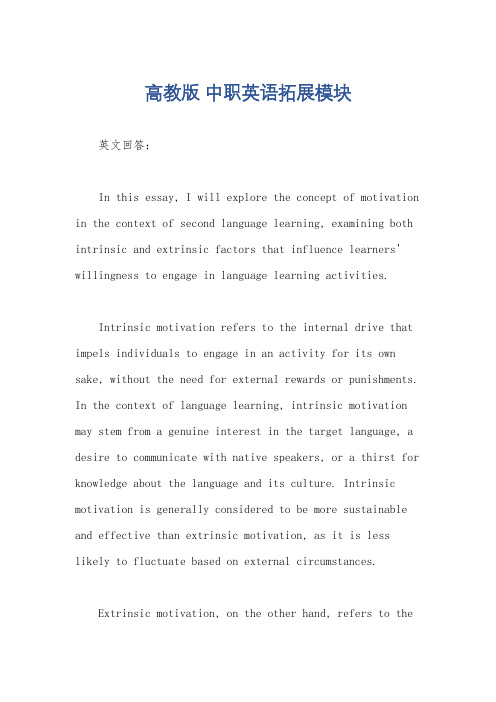
高教版中职英语拓展模块英文回答:In this essay, I will explore the concept of motivation in the context of second language learning, examining both intrinsic and extrinsic factors that influence learners' willingness to engage in language learning activities.Intrinsic motivation refers to the internal drive that impels individuals to engage in an activity for its own sake, without the need for external rewards or punishments. In the context of language learning, intrinsic motivation may stem from a genuine interest in the target language, a desire to communicate with native speakers, or a thirst for knowledge about the language and its culture. Intrinsic motivation is generally considered to be more sustainable and effective than extrinsic motivation, as it is less likely to fluctuate based on external circumstances.Extrinsic motivation, on the other hand, refers to theexternal factors that can influence an individual's willingness to engage in an activity. In the context of language learning, extrinsic motivation may include factors such as grades, rewards, praise, or the desire to avoid negative consequences. While extrinsic motivation can be effective in the short term, it is often less sustainable than intrinsic motivation, as it relies on external factors that may not always be present.Both intrinsic and extrinsic motivation can play a role in second language learning, and the most effective approach to motivation will vary depending on theindividual learner. For some learners, intrinsic motivation may be sufficient to drive them to engage in language learning activities, while others may require moreextrinsic motivation to get started. It is important to note that intrinsic and extrinsic motivation are not mutually exclusive, and many learners may be motivated by a combination of both factors.In addition to intrinsic and extrinsic motivation, a number of other factors can also influence learners'willingness to engage in language learning activities. These factors include:Age: Younger learners are often more receptive to new languages than older learners.Learning style: Some learners prefer to learn through reading and writing, while others prefer to learn through listening and speaking.Cultural background: Learners from cultures that are more accepting of language diversity may be more motivated to learn a second language.Language learning environment: The learning environment can have a significant impact on learners' motivation. A supportive and encouraging environment can help learners to stay motivated, while a stressful or negative environment can discourage learners.By understanding the factors that influence motivation in second language learning, educators can create learningenvironments that are more likely to foster sustained motivation in their students. This may involveincorporating activities that appeal to learners' intrinsic interests, providing opportunities for learners to use the language in meaningful ways, and creating a supportive and encouraging learning environment.中文回答:在本篇文章中,我将探讨动机在第二语言学习中的概念,考察影响学习者参与语言学习活动的内在和外在因素。
中职英语拓展模块Unit_4

5. Act and practice.
Situation
Mike is going to change his job next year. He wants to take an accounting course for the certificate examination. Now he is talking to the staff of the training school.
GRADING SCALE
EFFORT
A. 95—100 B. 86—89 C. 74—79 D. 63—66 F. 0—59
1. Consistency shows effort 2. Needs to show more effort 3. Shows little or no effort
REPORTING
Speaking, Listening and Pronunciation
This course is for students who wish to develop the important skills of speaking and listening. Emphasis is also placed on pronunciation.
A. Register for class. C. Call the teacher.
B. Buy the textbook. D. Rent an apartment.
4 What will not the woman study?
A. History. C. Philosophy.
B. Math. D. Science and Art.
1
PERIOD
READING
高教职高基础模块unit04.ppt
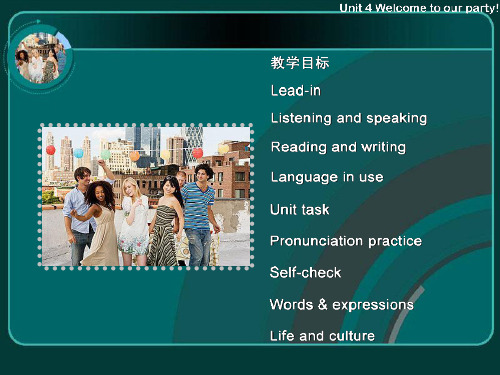
Activity 8
Listen and complete. 再听录音,补全对话。
Li Xiaonian: Hello, Mrs Smith! __W_e_l_c_o_m_e__ to our party! Mrs Smith: ___H_e_l_lo____, Xiaonian!
Li Xiaonian: Would you ____lik_e_____ something to drink, Mrs Smith? Mrs Smith: Uh, coffee, __p_l_e_a_s_e___.
Miss Li: Yeah, it’s sunny but cold. Mrs Stone: Is it always cold at this time in Xi’an?
Miss Li: Yes, it’s usually cold and windy. What’s the weather like in Australia now? Mrs Stone: Well, it’s usually warm and pleasant at this time.
Lead-in
1
Activity 1
Activity 1
Listen and match. 听录音,将聚会、天气和需要的物品 连线。
高教版英语1(高职高专版)(第三版)课件unit 4

Dialogue B
This Is Mr. Smith Here
(Now Wang Fang is speaking to Mr. Smith on the
phone.) Mr. Smith: Hello, this is Mr. Smith here.
电话
Miss Wang:
Good morning, Mr. Smith. This is Wang Fang. I work for Shanghai No.1 Shoe Factory. I’d like to make an appointment for our manager, Mr. Li, to meet you. It’s about the shoe exhibition you’re holding next month.
When one arranges to see someone at a fixed time, one makes an appointment. If one then actually sees the person as arranged, one is said to keep the appointment. If it will be impossible to meet after all, one should write or telephone to cancel the appointment.
Focal Function and Patterns
3) Dialing the wrong number I’m sorry, nobody by that name lives here. I’m afraid you’ve dialed a wrong number.
Unit 4课件-2021-2022学年中职英语(第三册)(山东省职业教育出版)拓展模块

Unit 4
Nodding the head means agreement. 点头表示同意。 Mr. Brown nodded when he passed me in the street. 布朗先生在街上走过我身旁时向 我点了点头。
Unit 4
They like “seeing the bottom” of all the plates. 他们喜欢看到盘子见底。 The book I want is right at the bottom of the pile. 我想要的书就压在那堆书的底 层。
Unit 4
The host will think you don’t like it. 主人会认为你不喜欢它。 Who will be the host for our party? 谁是今天晚会的主持人?
3. talk about table manners.
Unit 4
□ Let the elders have a seat first. □ Finish all the food on your plate. □ Don’t keep the spoon inside the bowl. □ Say “enjoy your meal” before you leave the table, if others haven’t finish. □ Help a woman pull her chair to the table. □ Say “Excuse me” if you are going to go to the restroom.
unit-_4职高英语基础模块2unit4PPT课件

15
16
Work in groups of four and brainstorm.
traffic jams in big cities
17
Read Wang Lu’s blog.
It has been ten years since I last came to New York. When I first came here to study in a university in 1997, everything seemed new and strange. It took me some time to learn the American way of living. I bought a second hand car when I found my first part-time job. It was exciting to drive for the first month, but later I got very tired of it. There were terrible traffic jams in rush hours.
Which city have you been to? What was the transportation like in that city? Did you take ... (subway / bus ...)? Which means of transportation did you like best / least?
13
Make a survey about the transportation in a city.
Student 1
Student’s name
Places he / she has been to
中等职业学校公共基础课程 英语 职业模块 Unit 4 PPT课件(基础版)

√
4. Crane operators are not allowed to wear jewelry. √
5. Crane operators are not allowed to use their mobile phones but can eat and drink during an operation.
5.What mustn’t a crane operator do during an operation? A crane operator mustn’t use a mobile phone, talk, eat or drink during an operation.
Viewing , Listening and Speaking
3. How should you push the trigger? We should push the trigger very slightly/lightly.
Viewing , Listening and Speaking
Section Two
Viewing Listening Speaking
中等职业学校公共基础课程教材配套课件
NEWSTART ENGLISH FOR VOCATIONAL EDUCATION
英语
职业模块
Machines and Operators
One machine can do the work of fifty men. No machine can do the work of one skilled man.
Viewing , Listening and Speaking
Exercise III Listen again and answer the questions.
中职英语 Part5 Unit4 课件【中职专用】高二英语(高教版2021 拓展模块)2023修订版

It+be+ 过去分词 +从句
It is said that...据说…… It is known that...众所周知…… It is reported that...据报道…… It is believed that...人们相信……
1.在主从复合句中,充当主语的从句叫主语从句。
一般位于句首,与陈述句中主语位置相同。
e.g.
That he will join our company is certain.
主语从句
谓语 表语
Whether you are right remains unknown.
主语从句
谓语 表语
主语从句的连接词
宾语从句的时态 Jim had been ( be ) a worker two years before. Jim would cook ( cook ) dinner the next day.
He said (that) Jim was singing ( sing )a popular song then.
how等 转换为以it作形式主
语的句子
Why he didn’t come here is not clear to anyone. =It is not clear to anyone why he didn’t come
here. 谁也不清楚他为什么没来。
It做形式主语的主语从句
后置主语从句
例句
应注意的问题
④what 和who 引导主语从句时,主句谓语的数应与主句中 作表语的名词保持一致。
1.What she needs ___is___ money. 2.What I need __a_r_e__ books.
实用高职英语教师用书PPT_Unit Four
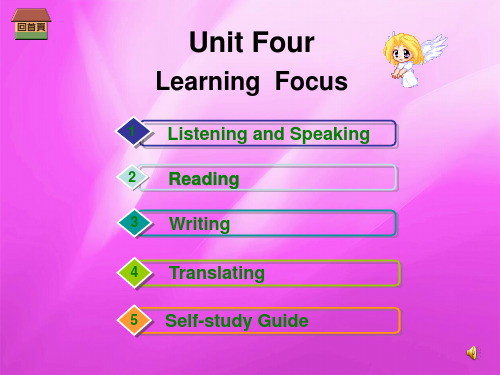
真讨厌!我还得跟他讨论这事。
8. It’s a pity that we are not getting enough workers.
真遗憾,我们招不够工人。
9. It's a shame that we cannot manage the shop properly.
很遗憾,我们不能很好的管理商店。
我期待的可不是这样的。
9. I regret to say that, at this stage, such an arrangement would be rather premature.
我很遗憾地说,在这一阶段,这样一种安排是相当不成熟的。
10. I bitterly regret that we haven't been able to do better.
我们非常遗憾地宣布由于天气原因所有上午的班航都将延误。
Practical College English for Careers
Part A Listen and Repeat
1. Functional Patterns: expressing disappointment and regret
disappointment and regret 13. I am very regretful for all the misunderstandings
['ri:fʌnd] n.退钱
skirt
[skɜ:(r)t] n.裙子
Practical College English for Careers
Part B Listening Practice
Phrases and Expressions
- 1、下载文档前请自行甄别文档内容的完整性,平台不提供额外的编辑、内容补充、找答案等附加服务。
- 2、"仅部分预览"的文档,不可在线预览部分如存在完整性等问题,可反馈申请退款(可完整预览的文档不适用该条件!)。
- 3、如文档侵犯您的权益,请联系客服反馈,我们会尽快为您处理(人工客服工作时间:9:00-18:30)。
However, you may want to indicate that you are not satisfied with the answer. That’s not really what I was asking. What I meant was…
OK, but what I really wanted to know was…Ed Nhomakorabeacation
Discussion skills --- Questioning An important part of discussion is asking questions. In a seminar, there is normally time for questions and discussion following the presentation. You will also need to ask questions in less formal group discussion. In either situation, unclear or vague questioning can be problematic. For example, questions may be misunderstood if the point is lost in an over-long, unfocused sentence. One practical solution is to keep your questions short. Don’t forget that , when you start to speak, you need to make clear whether you are asking a question or making a comment.
Sorry, I’m still not clear about… Perhaps I didn’t make my question clear. What I was really asking was …
Practice
Work in small groups of 4 or 5. without any preparation, tell the others about your primary school. Each student should speak for no more than 60 seconds. Someone in the group should time each speaker, and stop them if they exceed the time limit. After each person has spoken, the others in the group should each ask at least one question. Use a different expression each time you ask a question.
What did you mean when you said…?
Could you give me an example of …? More information
I was interested in what you were saying about …
Could you tell us more about…? Could you expand a bit on what you were saying about…?
Useful language Introducing a question I’ve got a question about… Could I ask a question…? Sorry, could I just ask…? Clarification Sorry, I didn’t follow what you said about…?
Discussion point 1: Choosing a university / college Preparation (individual) 1. Below are some of the criteria that may influence your choice of university or college. First, select which ones you will consider, or have already considered., in making your personal choice of institution. Delete any you don’t consider relevant to you. Would you take any other factors into account? Add any other criteria to the list.
Checking comprehension So you mean…? So you’re saying …? Can I just check I’ve understood – did you say …?
Have I got this right …?
Responding to answers A final aspect of questioning is how you respond to the answer you are given. It’s important to let the person answering your question know whether their answer is satisfactory; for one thing, they need to know if they’ve said enough! If they have, it may be enough simply to nod, or you could say one of the following. Yes, I see. OK, thanks. Thanks, that’s clear now.
